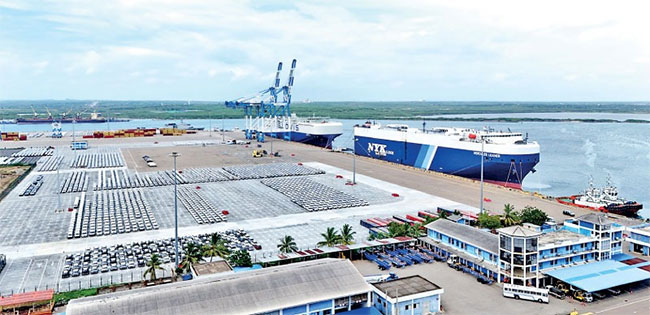Trouble for Sinopec oil refinery in Hambantota Port – report
June 7, 2025 12:29 pm
The proposed $3.7 million oil refinery to be built by China’s Sinopec in Sri Lanka’s Hambantota port is facing significant delays over multiple issues like dispute over equity structure, tax concessions, market access, and allocation of land for the project.
The inland port is built in a natural harbour near the town of Hambantota in the district of the same name on the southeastern coast of Sri Lanka, located 250 kilometres from Colombo. Unable to repay its debt, Sri Lanka gave China a controlling equity stake and a 99-year lease for Hambantota port, which it handed over in December 2017.
In the pact signed on January 16, 2025, during the visit of Sri Lankan President Anura Kumara Dissanayake to Beijing from January 14 to 17 following his visit to India in December 2024, China Petroleum and Chemical Corporation, or Sinopec, the world’s biggest refinery, agreed to expand its economic and energy footprints by building a massive oil refinery in Hambantota.
The agreement promised a facility capable of processing 2,00,000 barrels of crude oil per day. Incidentally, the Sri Lankan government had originally envisioned a 1,00,000 barrels per day refinery when Expressions of Interest (EoI) were called. While hailed by Sri Lankan officials as a landmark foreign investment, the deal had raised deep concerns about sovereignty, environmental integrity, and long-term economic independence.
This expansion had raised red flags with China controlling a major deep-water port and a potential mega refinery. However, the project in Sri Lanka is considered a top priority at Sinopec. The refinery is planned adjacent to the Hambantota port that China Merchant Port Holdings controls, on a 99-year lease.
The refinery project in Sri Lanka is a move by the top Chinese and global refiner to secure more markets overseas. The Sinopec investment was cleared in November 2023 during the term of Dissanayake’s predecessor, Ranil Wickremesinghe. Under debt-trap diplomacy, China woos foreign leaders and signs deals, which are dual-use in nature.
The original Request for Proposal (RFP) had stipulated foreign equity to be capped at 20 per cent and mandated 80 per cent of the projected output per day to be earmarked for exports. However, Sinopec is seeking a larger equity share and dilution of the 80 per cent export obligation to enable it to gain wider access to the domestic market in Sri Lanka.
Sri Lanka authorities have, till now, ruled out any changes in the RFP. Separately, the Ceylon Petroleum Corporation (CPC) has raised concerns that unrestricted market access for Sinopec could severely disrupt the petroleum sector in Sri Lanka and adversely affect energy security.
The Sri Lankan government had initially offered 500 acres of land for the project in Arabokka, Hambantota, and Sinopec subsequently requested an additional 200 acres of land just 3.5 kilometres from the Chinese-controlled port.
The authorities concerned are yet to decide on the quantum of land to be allocated, and there is also the related issue of lease duration for the land to be allocated. Hence, no formal agreement has been reached in this regard. Meanwhile, the Central Environment Authority (CEA) had issued the terms of reference to Sinopec to carry out an environmental impact study and submit the report to it.
Source: IANS
--Agencies












